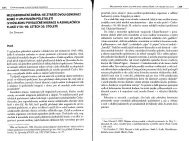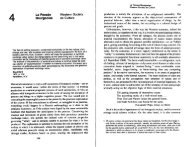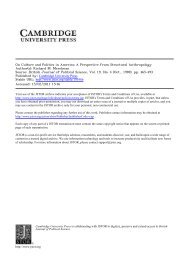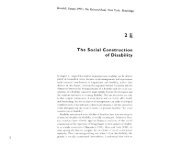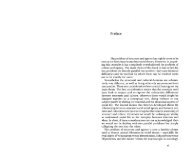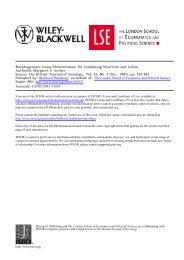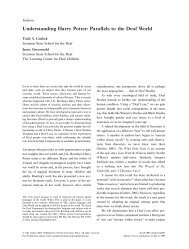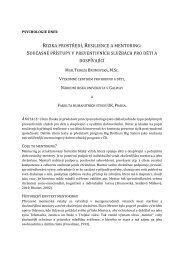Culture and Practical Reason Two Paradigms of ... - Moodle
Culture and Practical Reason Two Paradigms of ... - Moodle
Culture and Practical Reason Two Paradigms of ... - Moodle
- No tags were found...
You also want an ePaper? Increase the reach of your titles
YUMPU automatically turns print PDFs into web optimized ePapers that Google loves.
Chapter <strong>Two</strong> 88 <strong>Culture</strong> <strong>and</strong> <strong>Practical</strong> <strong>Reason</strong><strong>Two</strong> <strong>Paradigms</strong> <strong>of</strong> Anthropological Theory89takes environmental factors into consideration in its attempts to elucidatecultural phenomena, but that it gives biological meaning to thekey terms-adaptation, homeostasis, adequate functioning,survival-<strong>of</strong> its formulations. [1971, p. 243]The theoretical practice might be called "ecology fetishism," Nothingcultural is what it seems; everything is mystified as a natural fact which hasthe ostensible virtue <strong>of</strong> being basic <strong>and</strong> exact although it is essentiallyabstract. Marriage becomes "an interchange <strong>of</strong> genetic materials," ashunting is "an interchange <strong>of</strong> energy with the environment," com, beans,<strong>and</strong> squash are an "unbalanced diet," society a "population" <strong>of</strong> humanorganisms, <strong>and</strong> cannibalism a "subsistence activity." ("In examiningcannibalism, we are operating from the premise that all activities whichmake food available for group members, food which they then actuallyconsume, are 'subsistence activities' <strong>and</strong> that they can then be comparedindividually <strong>and</strong>/or taken together as constituent activities in an overallbehavioral repertory called 'food-getting pattern' "-Domstreich <strong>and</strong>Morren 1974, p. 3). The same way <strong>of</strong> thinking as applied to the discovery<strong>of</strong> sanitary values in dietary tabus Douglas (1966) has called "medicalmaterialism." It is only a particular anthropological or ecological version<strong>of</strong> the exchange <strong>of</strong> meaningful content for functional truth that Sartredescribed as the vulgar Marxism. 26 This petty metaphysical commerce in26. As for Marx himself, far from being implicated, it was he who gave such fetishism itsmost general criticism <strong>and</strong> explanation: "The apparent stupidity <strong>of</strong> merging all the manifoldrelationships <strong>of</strong> people in the one relation <strong>of</strong> usefulness, this apparently metaphysicalabstraction arises from the fact that, in modern bourgeois society, all relations aresubordinated in practice to the one abstract monetary-commercial relation. This theorycame to the fore with Hobbes <strong>and</strong> Locke.... In Holbach, all the activity <strong>of</strong> individualsin the mutual intercourse, e.g., speech, love, etc., is depicted as a relation <strong>of</strong> utility <strong>and</strong>utilisation. Hence the actual relations that are presupposed here are speech, love, thedefinite manifestations <strong>of</strong> definite qualities <strong>of</strong> individuals. Now these relations are supposednot to have the meaning peculiar to them but to be the expression <strong>and</strong> manifestation<strong>of</strong> some third relation introduced in their place, the relation <strong>of</strong> utility or utilisation.... All this is actually the case with the bourgeois. For him only one relation isvalid on its own account-the relation <strong>of</strong> exploitation; all other relations have validityfor him only ins<strong>of</strong>ar as he can include them under this one relation, <strong>and</strong> even where heencounters relations which cannot be directly subordinated to the relation <strong>of</strong> exploitation,he does at least subordinate them to it in imagination. The material expression <strong>of</strong>this use is money, the representative <strong>of</strong> the value <strong>of</strong> all things, people <strong>and</strong> social relations.Incidentally, one sees at a glance that the category <strong>of</strong> 'utilization' is first <strong>of</strong> allabstracted from the acttlal relations <strong>of</strong> intercourse which I have with other Jleol?le (butby no means from reflection <strong>and</strong> mere will) <strong>and</strong> then these relations are made out to bethe reality <strong>of</strong> the category that has been abstracted from them themselves, a wholly metaphysicalmethod <strong>of</strong> procedure" (Marx <strong>and</strong> Engels 1965, pp. 4~1).ethnographic details would hold no interest were it not for its avowedintention <strong>of</strong> engrossing the concept <strong>of</strong> culture.Malinowski opposed "culture" to behavior; for ecology, it is "behavior."It may be learned behavior, but it is not by that characteristicworthy <strong>of</strong> different treatment than the "species-specific behavior" <strong>of</strong> anyother group <strong>of</strong> organisms. Think <strong>of</strong> it simply as a "cultural repertoire"(Collins <strong>and</strong> Vayda 1969, p. 155). Thus understood, the phenomenon assuch does not distingUish man from any other species, nor anthropologyfrom biology. As "behavior"-or even more abstractly, "bodilymovements" -culture can be studied in the same way as the actions <strong>of</strong>anyanimal, that is, as good for the species or bad for it under the selectiveconditions as naturally constituted:Attention to cultural ideas, values or concepts cannot, however, besaid to be a sine qua non <strong>of</strong> the analysis <strong>of</strong> ecosystems including man.One may choose rather to place emphasis upon the actual physicalbehavior or bodily movements through which man directly effects alterationsin his environment . ... Indeed, a possible approach,suggested by Simpson ... among others, is to regard human culturesimply as the behavior or part <strong>of</strong> the behavior <strong>of</strong>a particular species<strong>of</strong>primates. By so regarding it we are enabled to study <strong>and</strong> interpret itas we do the behavior <strong>of</strong> any other species: for example, with respectnot only to its interaction with environmental variables but also to theeffect <strong>of</strong> this interaction upon natural selection. The fact that humanbehavior is complex, varied, variable, <strong>and</strong>, to a considerable extent,population-specific may make observation <strong>and</strong> description formidabletasks, but it does not mean that basically different principles must beused in the study <strong>of</strong> human behavior <strong>and</strong> the study <strong>of</strong> behavior in otheranimal species. [Vayda 1965, p. 4; emphasis mine]The ecological functionalism puts culture in double jeopardy. It isthreatened with liquidation because it cannot be specified as such bynatural reasons, <strong>and</strong> because consideration <strong>of</strong> its specific quality wouldinvite in a reason <strong>of</strong> another nature. The crisis then becomes ontological inits proportions. <strong>Culture</strong> is exchanged for "behavior. " Its concrete qualitiesare only the appearance <strong>of</strong> "bodily movements" whose wisdom is theirbiological effect. Ontology thus recapitulates methodology. And anthropologyloses its object. The properties <strong>of</strong> culture having been ignoredin the practice <strong>of</strong> its explanation, it is presumed that these properties haveno autonomy or value as such-which is a rationalization <strong>of</strong> the fact thatthe explanation cannot account for them:



